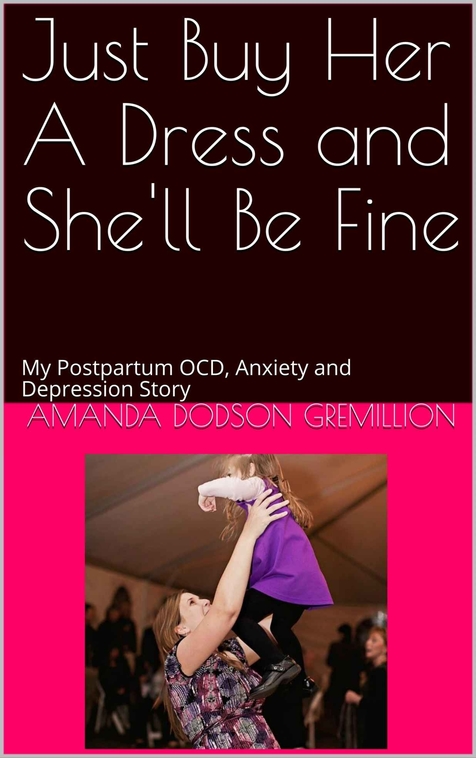
The emotionally charged yet sensible treatise, Just Buy Her a Dress and She’ll Be Fine by Amanda Dodson Gremillion, is the moving story of postpartum depression and OCD as it played out in the author’s own life, and how that became a medium for guiding others.
Gremillion’s mental distress seemed to begin when she had her first child. She and her husband Jay had met in their early teens, courted for ten years, and married – happily, at first. Both wanted a child and when their daughter Aubrie Lynn was born, she was welcomed.
Soon afterwards, the problems set in. There was the tiredness inherent in the routine of caring for the baby, along with some personal crises for Gremillion: her grandfather died, she lost a good job and had to take a less than pleasant temping position, and then got a permanent position at lower pay. She began predicting and planning and panicking about the smallest events; her mind would race to the worst possible outcome.
Some pills worked though they did not make her “happy” – just sufficient to keep her thoughts, sometimes suicidal, in check. Her husband felt helpless as she deteriorated, and left, exacerbating her suffering and guilt. Sometimes she cursed God, at other times turned to religion for solace. After some time, Jay came back, when the author was on a road to recovery, far more able to face her fears, and let things be.
Much of what Gremillion describes about her condition involved self-doubt, so seeing some old keepsakes that affirmed the high opinion others held of her was one small turning point. She reached out through blogs and books, and came to recognize the roots of her anxieties. She came from a poor, lower class background, and now believes that the struggles of her upbringing and her gradual rise to a more middle class status provided some of the many lessons learned and explored in this intimate memoir.
She has an enviably level viewpoint about life’s vicissitudes, asserting that real love is not a “first sight” phenomenon and that partners must grow and adjust with changing circumstances. Loving a sweet innocent child seems natural and easy, but life will “throw in some hard things to deal with,” and that, too, has to be understood and dealt with. Given this is such a tender subject, as mothers can be quickly criticized for having any of these feelings, the book should be soothing to those suffering from these issues, as well as helpful to those who don’t understand the complexity of the problem.
The key is Gremillion’s keen honesty and forthrightness; she is not afraid to lay herself bare, while providing a cogent and informative overview of this multifaceted topic. Gremillion is wise and honest enough to admit that some of her problems stemmed from mistakes that she made, some from her upbringing, and some from hormonal dysfunction. However, she also demonstrates that this is a widespread phenomenon. Statistics show, Gremillion states, that about 80% of women experience some postpartum depression, and it’s not enough to “just buy her a new dress,” as is too often the case. Even men, losing their time with their wives, may feel sense of depression after a baby is born, so the book has a far wider audience than just new mothers.
All told, this story of triumph is inspiring and informative. Gremillion has learned how to prioritize, to relinquish some control over events, and to practice self-therapy, part of which includes writing this book and sharing her experiences with others going through similar crises, which should be highly helpful to a wide array of readers.
Book Links
STAR RATING
Design
Content
Editing
Get an Editorial Review | Get Amazon Sales & Reviews | Get Edited | Get Beta Readers | Enter the SPR Book Awards | Other Marketing Services























Leave A Comment